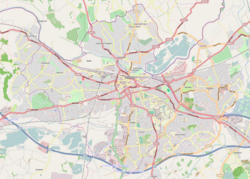Prospect Park, Reading
| Prospect Park | |
|---|---|
 View across the park and the Mansion House on the hill | |
| Type | Public |
| Location | Reading, Berkshire, UK |
| Coordinates | 51°26′52″N 1°00′33″W / 51.44791°N 1.00911°W |
Prospect Park is a public park in the western suburbs of Reading northbound Bath road in the English county of Berkshire.
History
Originally the site of Dirle's Farm, the land was part of the Calcot Park estate. In the 1760s, Benjamin Child turned the farm into a mansion. Child was the widower of the famous "Berkshire Lady", Frances Kendrick,[1] whom he had first met there some years before. He named the park after its views over Reading; it was formerly known as Prospecthill Park.[2] The park was bought by the Reading Corporation in 1902.[3]
The Mansion House

The present regency style house, known as The Mansion House (and originally named Prospect House), was built by John Liebenrood in the late 18th century. It is a Grade II listed building,[4] currently used as a restaurant.
John Engelberts Liebenrood (1754-1821) was born in Germany in 1754. His birth name was John Engelberts Ziegenbein and he immigrated to England and obtained naturalisation in 1781.[5] He lived with his great uncle John George Liebenrood, a very wealthy merchant in Purley. When his uncle died in 1795 he inherited his fortune and in accordance with the will changed his name to Liebenrood.[6] In the following year he married Lucy Hancock whose brother was Rear Admiral John Hancock.
Soon after his marriage John commissioned James Wright Sanderson, a pupil of James Wyatt to substantially remodel and enlarge a smaller existing building.[7] The newspapers show that he and his wife Lucy were living in their new home by 1797.[8] John became High Sheriff of Berkshire in 1806. Lucy was known to be a benefactor of the poor.[9] He died in 1821 and Lucy continued to live at Prospect House until her death in 1829. They are both buried in St Mary’s Church Purley.


Their son George and daughter Lucy inherited the property but they did not live there. Instead it was rented for many years to William Stephens (1783-1856) who at one time was the Mayor of Reading.[10] He died in 1856 and it was then rented by William Banbury (1813-1893) who was a banker in the firm Fuller Banbury and Co of London.[11] He was also an art collector and when he moved from Prospect Park in 1880 a sale of some of his paintings was held by Christie's at the House.[12]
George and Lucy Liebenrood did not have any children so when they died Prospect Park was inherited by their cousin Captain John Hancock. He changed his name to Liebenrood in 1865 as a condition of the inheritance.[13] John was born in 1813 Prince Edward Island in Canada. His father was Rear Admiral John Hancock. In 1847 he married Eliza Cambridge (1818-1888) the daughter of Lemuel Cambridge, a shipowner of Canada.[14] He entered the navy in 1827 and spent 35 years in the naval service rising to the rank of Captain. He died in 1883 and his wife Elizabeth died in 1888. Both are buried in the Church of St Michael, Tilehurst.
Their son Major George Engelberts Liebenrood (1847-1928) inherited the house after Elizabeth’s death. George was born in 1847 on Prince Edward Island, Canada. At the age of 18 he went to the Royal Military College, Sandhurst.[15] He had a distinguished military career and rose to the rank of Major. In 1881 he married Winifred Markham (1858 -1930), the daughter of Arthur Bayley Markham of Glendon. The couple lived at Prospect Park for about fourteen years and then in 1902 they sold it to the Reading Borough Council.
Sports
The first race in the Hampshire League Cross Country series in 2013 was held in the park.[16] Other races in the park have included The Color Run[17] and Cancer Research UK's Race for Life.[18]
References
- ^ Phillips, Daphne (1980). The Story of Reading. Countryside Books. p. 95. ISBN 0-905392-07-8.
- ^ "Sheet 268 - Reading (Outline)". National Library of Scotland. Retrieved 15 July 2014.
- ^ Phillips, Daphne (1980). The Story of Reading. Countryside Books. p. 141. ISBN 0-905392-07-8.
- ^ "Prospect House, Prospect Park, Reading". British Listed Buildings. Retrieved 11 June 2011.
- ^ Letters of denization and acts of naturalization for aliens in England and Ireland , p. 187. Online reference
- ^ Reading Mercury - Monday 02 February 1795, p. 3.
- ^ English Heritage List. “Prospect Park” Online reference
- ^ Reading Mercury - Monday 02 October 1797, p. 4.
- ^ Dearing, John 2013 “Reading Book of Days”. Online reference
- ^ Berkshire Chronicle - Saturday 26 April 1856, p. 4.
- ^ Berkshire Chronicle - Saturday 25 March 1893, p. 2.
- ^ Reading Mercury - Saturday 05 June 1880, p. 5.
- ^ The London Gazette 17 January 1865, p. 214. online reference
- ^ Illustrated London News - Saturday 26 May 1883, p. 21.
- ^ Kent & Sussex Courier - Friday 30 November 1928, p. 2.
- ^ http://www.hampshireathletics.org.uk/events/hxcl_reading.html
- ^ "READING Rainbow Run!". Helen and Douglas House. Retrieved 15 July 2014.
- ^ "Reading Prospect Park". Cancer Research UK. Retrieved 15 July 2014.
External links
![]() Media related to Prospect Park, Reading at Wikimedia Commons
Media related to Prospect Park, Reading at Wikimedia Commons

